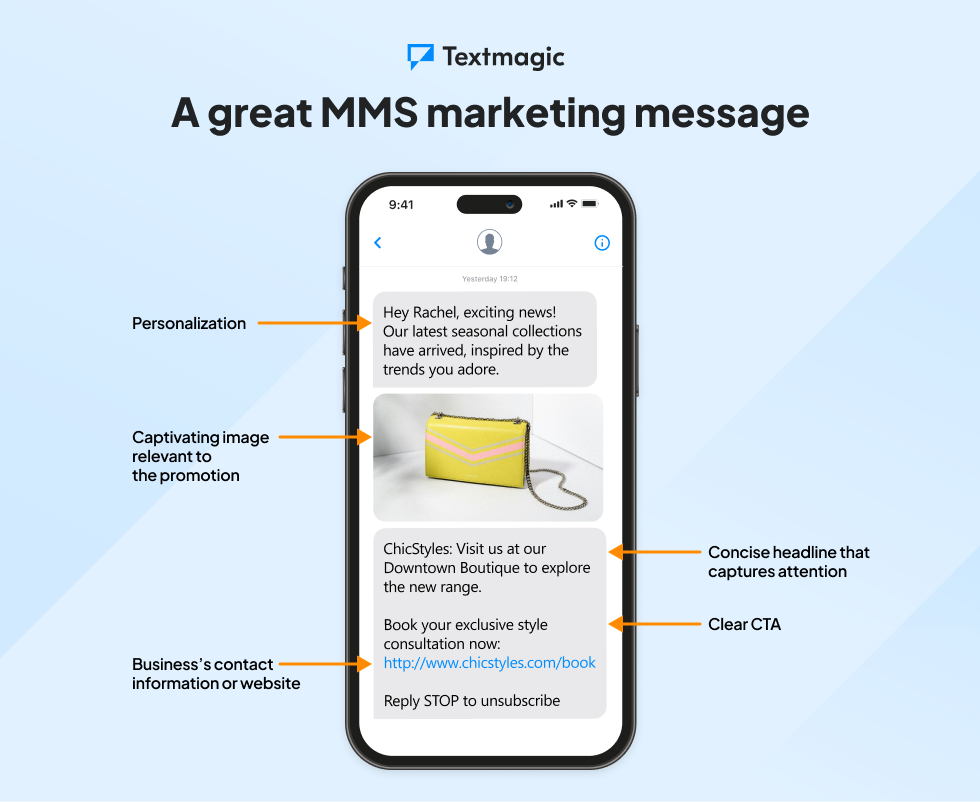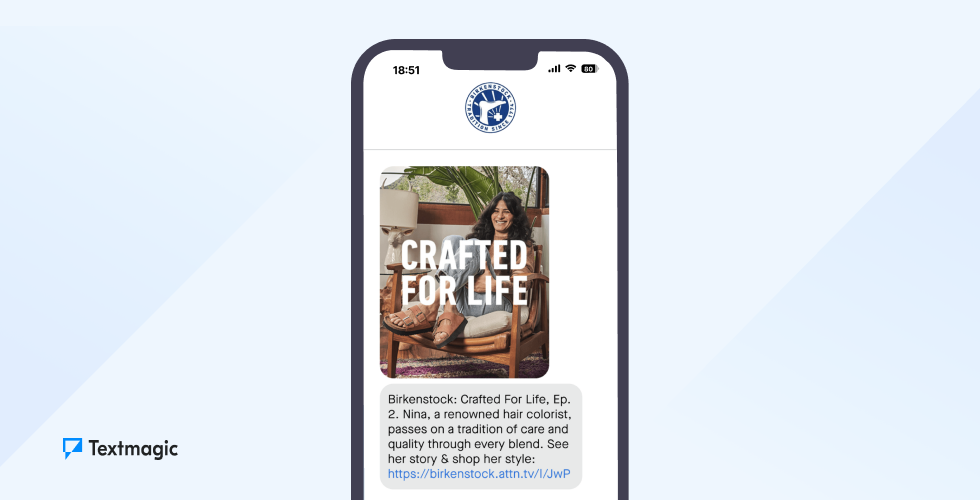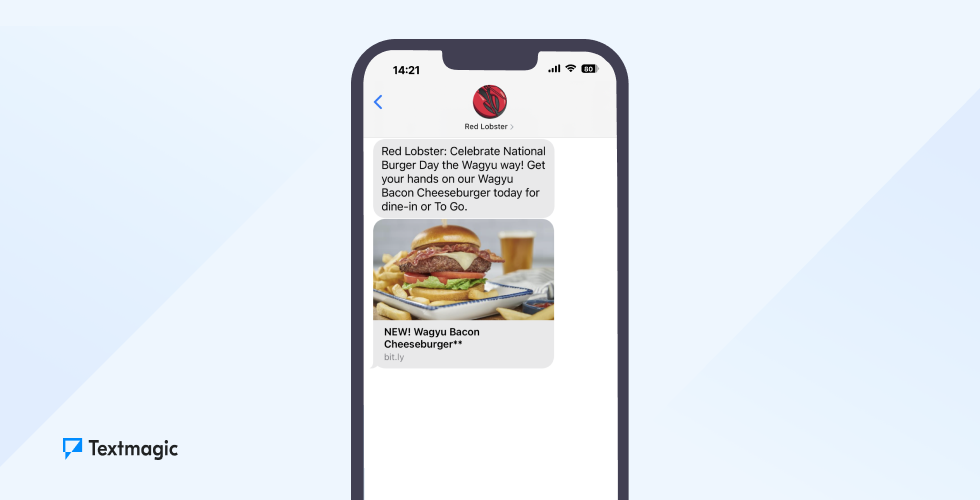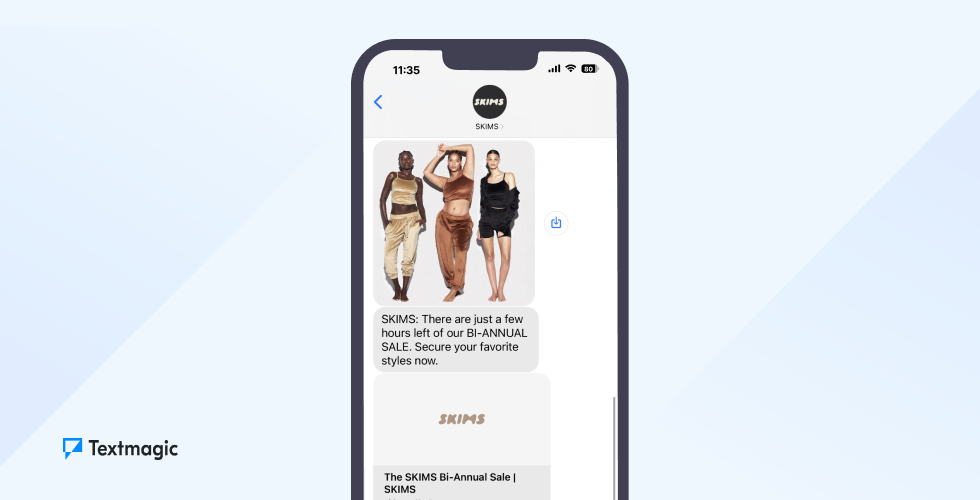
Projected to reach 7.5 billion users by 2026, the growth in mobile users highlights the rising potential of both SMS and MMS. By adopting the right strategy, MMS marketing can draw in more customers, increase engagement, and amplify the impact of your campaigns.
This article provides a comprehensive guide to MMS marketing, delving into how it can efficiently transform customer interactions.
What is MMS marketing?
MMS marketing, short for Multimedia Messaging Service marketing, is a mobile advertising method that enables businesses to deliver multimedia-rich content, like images, audio, and video, to a targeted audience.
It represents an upgraded form of regular text messages, providing a visually engaging and interactive approach.
While MMS marketing incorporates multimedia content to convey promotional messages and engage audiences, MMS messaging, on the other hand, refers to the broader use of Multimedia Messaging Services for sending multimedia content in various contexts, not limited to marketing.
MMS marketing vs. SMS marketing
When comparing MMS marketing and SMS marketing for businesses, it’s important to consider their distinct impacts and how they align with specific needs.
MMS marketing significantly enhances engagement with its ability to include rich media. Although more expensive, MMS can offer a higher return on investment in terms of customer interaction, particularly for visually-driven sectors.
Moreover, the shareability of MMS content on social media extends a campaign’s reach, making it invaluable for increasing digital visibility and audience engagement. Lastly, MMS is highly effective for product showcases, promotional coupons, and event marketing, leveraging visual appeal to influence and engage customers.
SMS marketing, on the other hand, provides a cost-effective approach, ideal for straightforward, text-based communication. It’s particularly effective for high-volume campaigns like text-to-join initiatives or for sending transactional messages such as order confirmations and appointment reminders.
The affordability and lower data usage of SMS are beneficial for businesses with budget constraints, ensuring efficient communication without overspending.
| Feature | MMS Marketing | SMS Marketing |
|---|---|---|
| Message Length | Can include longer texts and multimedia content | Limited to 160 characters per message |
| Content Type | Supports images, videos, audio, and text | Text-only messages |
| Costs | Generally higher due to multimedia content | Lower compared to MMS |
| Engagement | Higher engagement due to rich content | Less engaging but widely accessible |
| Delivery Speed | Can be slower due to larger file sizes | Faster delivery due to text-only content |
| Compatibility | Requires MMS-enabled devices | Compatible with all mobile phones |
| Use Cases | Ideal for visually-driven campaigns | Best for concise, text-based communication |
| Analytics | More complex tracking due to diverse content | Simpler analytics focused on text delivery |
| Regulations | Must comply with MMS-specific regulations | Subject to standard SMS marketing regulations |
| Audience Reach | Potentially limited by device compatibility | Broader reach as it doesn’t require smartphones |
Advantages of using MMS for marketing
MMS marketing is a powerful tool for businesses due to its user-friendly nature. It allows for higher engagement rates as compared to traditional text messages.
The human brain processes visual information faster than text, making it more memorable. With the inclusion of images or videos, MMS offers an effective way to convey more complex messages, making it easier for customers to understand and engage with the content.
Unlocking the potential of MMS marketing presents several advantages that can transform your marketing approach:
1. Enhanced visual appeal
MMS marketing revolutionizes how businesses communicate, leveraging the power of visuals to make messages informative and visually striking. With images, videos, and GIFs, brands can create content that engages customers on a deeper level.
2. Increased brand visibility
Using MMS elevates brand recognition. Through visually impactful content, businesses imprint their brand identity in the minds of consumers, making it more recognizable and reinforcing their presence in the competitive landscape.
3. Richer content
Unlike traditional text messages, MMS provides a canvas for richer and more diverse content. Businesses can convey detailed information and product features, fostering a deeper connection with customers through immersive experiences.
4. Higher click-through rates
The visually appealing nature of multimedia content encourages recipients to interact, click on links, and explore further. This increases the likelihood of conversions and desired actions.
5. Viral potential
The captivating nature of MMS content enhances its potential to go viral. Users are more likely to share visually engaging messages, amplifying the reach of marketing campaigns.
6. Geotargeting
Whether promoting a local event or providing location-specific discounts, geotargeting through MMS enhances the effectiveness of marketing campaigns by delivering content that aligns with the recipient’s immediate surroundings.
7. Integration with social media
MMS integrates with popular social media platforms like Facebook, Instagram, and X. This allows businesses to extend their reach and cross-promote content.
8. Storytelling
Visual elements in MMS provide a powerful medium for storytelling. Brands can convey narratives or showcase product stories to create a stronger emotional connection with the audience.
9. Instant gratification
With MMS, businesses can provide instant value to consumers. Whether through visually appealing offers, exclusive promotions, or sneak peeks, multimedia messages deliver immediate gratification.
10. Cross-channel integration
Whether through social media platforms, email, or other digital channels, MMS adapts well to various communication mediums. Integrating MMS into different touchpoints allows businesses to maintain a unified brand identity.
MMS marketing use cases
When considering marketing through mobile channels, it’s important to understand when to use MMS as opposed to SMS. While SMS is versatile and suitable for various mobile campaigns, MMS offers an additional layer of versatility by incorporating multimedia elements. Therefore, an effective strategy often involves a combination of both SMS and MMS.
Below you will find campaign ideas that leverage the capabilities of MMS to maximize their impact:
- Product launches: To genuinely capture the interest of potential customers, it’s important to provide them with a visual preview of your offering.
- Event promotions: Promote upcoming events, conferences, or webinars with engaging visuals, event flyers, and speaker profiles to boost attendance.
- Customer testimonials: Share video or image testimonials from satisfied customers to build trust and credibility in your brand.
- Sales announcements: Include visual assets to illustrate discounts, deals, special offers, and deadlines, making your message truly stand out.
- New promotions: Use MMS to share collections, complete with images of a digital catalog that links to the same landing page featured in your promotional SMS marketing message.
- Product tutorials: Provide step-by-step product usage tutorials through images or short videos to educate customers and enhance their product experience.
- Interactive contests: Run interactive contests or quizzes with multimedia elements for increased participation and engagement.
- User-Generated Content: Encourage customers to share their experiences by submitting user-generated images or videos related to your products or services.
- Special announcements: Share important company announcements, achievements, or milestones with visually appealing graphics.
- Appointment reminders: Visual reminders outperform plain text, and you can incorporate images of calendars or other relevant visuals to make your reminders more memorable.
- Fundraising campaigns: Use multimedia elements to convey the impact of charitable contributions and encourage donations for fundraising campaigns.
- Customer surveys: Include visual elements in customer surveys to make them more engaging and increase response rates.
Best practices for MMS marketing
Elevating your MMS marketing game involves compelling content that resonates with your audience.
Here are some tips to guide you in crafting impactful MMS marketing campaigns:
- Ensure your MMS content is visually striking, engaging recipients from the moment they open the message.
- Maintain consistent branding elements across MMS and other marketing materials.
- Compress MMS image files for optimal delivery; keep file sizes under 300kb for successful delivery.
- If contextually appropriate, include promotions or special offers within the MMS mobile marketing campaign messages.
- Coordinate the timing of MMS delivery with other marketing channels to create a cohesive and non-intrusive customer experience.
- Given the mobile nature of MMS, ensure your content is optimized for various devices.
- Keep your messages to the point, delivering key information without overwhelming the recipient.
- Include a clear and compelling call-to-action in your MMS to guide recipients toward desired actions.
- Comply with privacy laws and implement the best practices for opt-in and opt-out processes.

Measuring the success of MMS campaigns
To ensure the effectiveness of your MMS marketing strategies and secure a strong return on investment, it’s crucial to regularly assess and optimize your campaign’s performance.
When assessing ROI for MMS marketing, consider the following key metrics:
- Delivery rate: Ensure high delivery rates by optimizing file sizes and formats for seamless transmission.
- Open rate: Craft compelling subject lines and visuals to boost open rates and capture audience attention.
- CTR: Implement clear and enticing calls to action to increase click-through rates.
- Cost per conversion: Optimize your campaigns by focusing on high-converting content and audience segments.
Successful MMS marketing campaigns
Consider these three real-life brand examples for insights into incorporating MMS into your business texting strategy:
Birkenstock

In their innovative “Crafted For Life” initiative, Birkenstock transcends traditional marketing by integrating authentic customer stories with the versatility and reliability of their footwear. The campaign revolves around a series of engaging videos that depict how Birkenstock shoes are an integral part of various life experiences, showcasing their durability and style.
Birkenstock elevates its content delivery by using MMS marketing, sharing customer stories in a more dynamic and interactive way. This approach goes beyond traditional text, engaging subscribers with multimedia storytelling.
MMS showcases Birkenstock’s products and brand values vividly. It presents the brand’s ethos and invites community engagement around quality and practicality.
Red Lobster

Red Lobster effectively uses MMS text marketing to announce special deals, notably launching the Wagyu Bacon Cheeseburger for National Burger Day. This method effectively showcases new menu items, enhancing promotion visibility.
MMS marketing’s versatility shines in this particular campaign. It adeptly promotes time-sensitive offers, drawing customers for both dine-in and to-go experiences. This strategy illustrates how MMS can be a powerful tool for limited-time promotions, creating immediate customer interest and action.
SKIMS

SKIMS harnesses MMS marketing to broadcast its biannual sales, new collections, and other major updates. This approach allows the brand to directly reach customers with timely and visually engaging announcements.
In this campaign, MMS marketing serves as an effective channel for keeping customers informed and excited about the latest offerings, demonstrating the practicality and impact of MMS in retail marketing strategies.
Challenges and limitations
Embracing MMS for marketing comes with its share of challenges that businesses need to navigate, such as:
| Challenge | Description |
|---|---|
| File Size Limits | MMS faces challenges due to restrictions on file sizes, limiting the amount of data that can be included in a single message. |
| Compatibility Issues | MMS marketing software may face challenges regarding compatibility, particularly when multimedia content is interpreted differently by various devices or carriers. |
| Higher Costs | MMS can be more expensive than SMS, which may challenge businesses with budget constraints. |
Conclusion
MMS marketing campaigns stand out as a versatile and effective tool across a wide range of industries, including retail, hospitality, healthcare, real estate, and entertainment. The key to leveraging the full potential of MMS marketing lies in understanding how it aligns with your brand’s unique message and audience.
By tailoring MMS content to resonate with your specific market, businesses can unlock new opportunities for revenue growth and create more impactful, engaging marketing strategies. This approach not only enhances audience engagement but also paves the way for a stronger connection between the brand and its consumers.












![Mangools Coupon Feb 2024 [55% Off, $684 Savings🔓]](https://marketingmagnetinsider.com/wp-content/uploads/2024/02/mangools-coupon-75x75.png)








